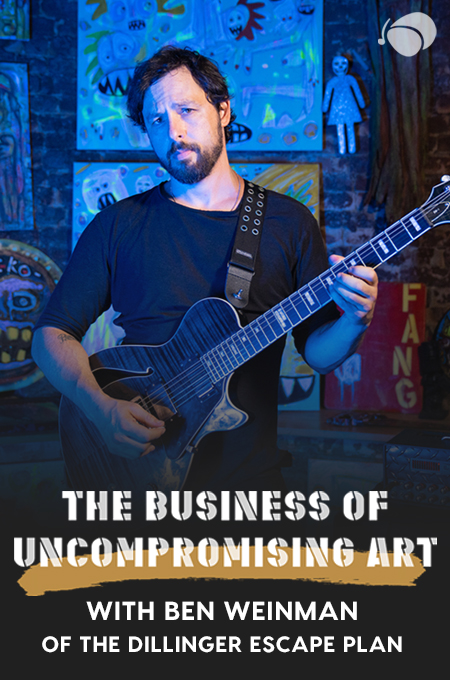+ This exclusive video is presented courtesy of Ben Weinman’s The Business of Uncompromising Art on Soundfly. Sign up to learn how to make a living as an artist without making compromises on your values.
When Ben started The Dillinger Escape Plan, they were trying to capture the ethos of the old punk and hardcore music they loved. Bands like Fugazi and Black Flag and labels like Factory Records had pioneered a DIY approach to the business of music that felt powerful, personal, and dangerous. Dillinger wanted to channel that in their career.
Some of the main lessons Ben took from those punk bands and labels are to:
1. Superserve your fans.
Punk bands have done this in all sorts of ways, from going the extra mile during shows to nurturing fan communities and creating zines. In doing so, many bands built passionate “tribes” (or subcultures) around their music and their fanbase.
2. Use scarcity to create extra value.
Creating a limited edition run of a product (even if it’s only limited because you’re making everything yourself) actually increases its value in the marketplace. Lots of DIY bands would do this by numbering items or only doing a limited run.
Sub Pop Records only pressed 800 copies of the Mudhoney single “Touch Me I’m Sick” to gin up demand, and it worked — it became an item everyone wanted.

3. Use the power of personal connection.
The underground scene was built on personal connection. Musicians hung out in the audience after a show, not backstage. They’d often play in basements rather than clubs. And bands often crashed on each others’ floors during tours.
Those things help forge deep, powerful connections within a community.
+ Read more on Flypaper: “What Happens in New Brunswick Shouldn’t Just Stay in New Brunswick.”
4. “Make it happen” ethos.
Lots of early punk and hardcore bands simply did not wait for permission. If there wasn’t a label interested in releasing their music, they’d create one. Factory Records famously opened their own club in a warehouse called The Haçienda that ended up hosting acts like New Order, The Smiths, and even Madonna.

5. Make a lot with a little.
Those underground bands knew how to do cool stuff without spending a lot of money. When Dillinger started, Ben didn’t even have a real guitar. They were also borrowing stuff from other bands, and vice versa. This became a useful perspective even when Dillinger got bigger and could afford more.
Ultimately, the punk ethos is about doing stuff yourself, without waiting for permission, in a frugal way that inspires people to want to be part of your subculture or community. Those became important themes throughout Dillinger’s career, and important lessons for anyone to keep in mind when creating their own business.
Rev Up Your Creative Engines…
Continue your learning with hundreds of lessons on songwriting, mixing, recording and production, composing, beat making, and more on Soundfly, with artist-led courses by Kimbra, RJD2, Com Truise, Kiefer, Ryan Lott, and Ben Weinman’s The Business of Uncompromising Art.



